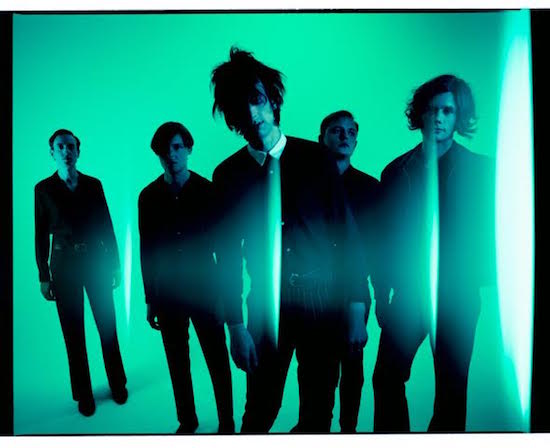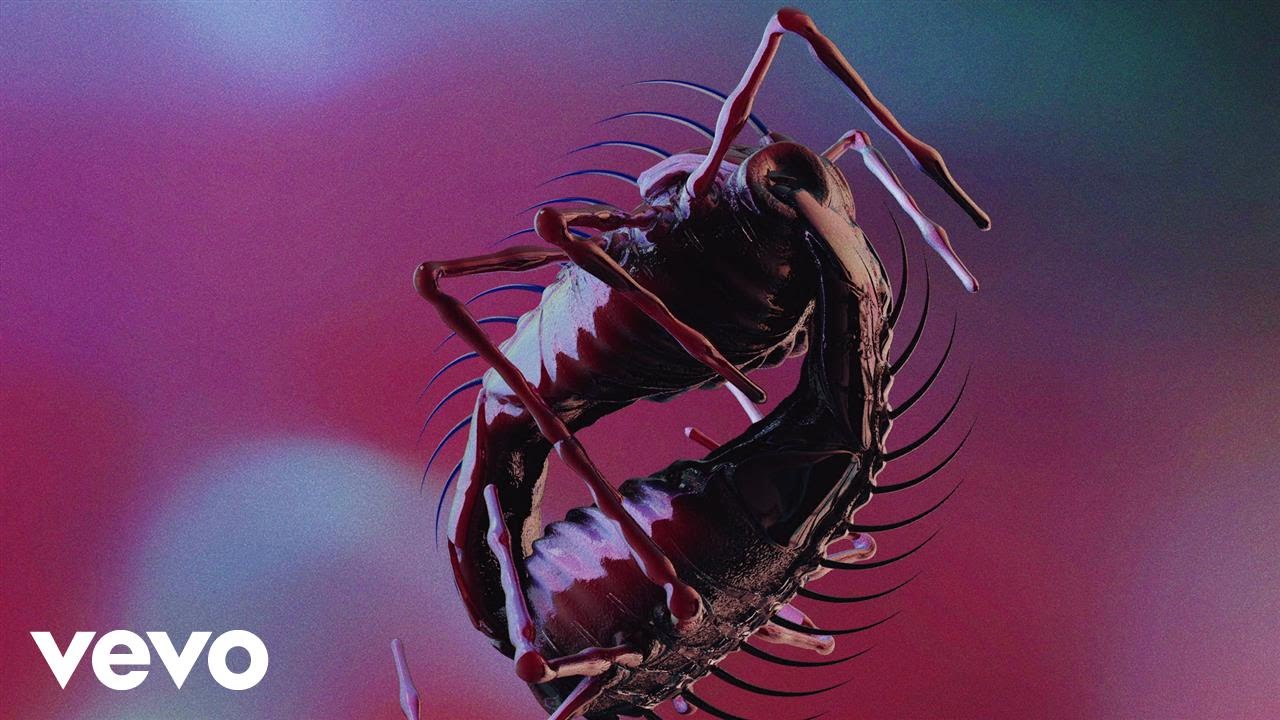There’s something visceral in this new album from The Horrors, a working-out of one’s place – physically – in the world and beyond it. The scale shifts about (“Insect in amber / Death of a star” as they sing in ‘Machine’) and there’s a creeping uncertainty mixed with romantic, weary resignation. In sound and purpose, it shares territory with Gary Numan’s electronic vulnerability, with Björk’s love-and-the-universe-explorations (as well as her Graham-Massey coproduced stormers), and even with Kafka – waking up in ‘The Metamorphosis’ wondering who the fuck you are and how you got stuck here. Tectonic plates are shifting: this album has some wonderfully grandiose ideas about itself.
‘Machine’, the lead single, is the absolute belter here. It lurches in all magnificent, like a robot monster doing the intro riff to ‘Walk This Way’, then it seems to skid on ice, tumble into chaos, and it pulls you down with it. There’s disdain in Faris’s voice, a depersonalised tone, and he seems to be dismissing both you and himself: “You will never never be… more than a machine.” There’s a touch of pomp, maybe a touch too much – the breakdown after that line is a bit like someone raising his eyebrow at you, going, "You get me, yeah?” But it doesn’t really matter – this is a gorgeous beast of a song, a thick slice of magnificent goth-rave chaos, because this is The Horrors and their magnificent goth-rave genes are strong.
So too on opening track ‘Hologram’ (which does sound like Gary Numan getting involved with Björk’s ‘Army Of Me’, and what a wonderful thing that would be). Alienation and throbbing disco combine, there’s vertiginous soaring and down-to-earth thudding. The Horrors have always been a band who listen to fantastic and far-ranging records, absorb influences, and do wonderful new things with them (as previously celebrated by The Quietus). It is no small delight to hear a suggestion of Lil Louis’s ‘French Kiss’ on closing track ‘Something To Remember Me By’, which also manages to sound like a pretty great long-lost Electronic single.
This kaleidoscope of influences from across the decades, made into something that always sounds like The Horrors, is frequently a wonderful thing. There are missteps, though. ‘Press Enter To Exit’ has a strong baggy whiff to it, a jangly touch of Happy Mondays, and it doesn’t quite work – perhaps because of the oddly whimsical, sardonic vocals and the chorus that never achieves lift-off. (The drumbeat, meanwhile, preechoes the rhythm in the next track, ‘Machine’, and it’s extremely pleasing.) That menacing matinee-idol croon that Faris Badwan can do – so perfectly on songs like Primary Colours‘ ‘Who Can Say’ – is not quite right here. On the second half of the album especially, there are touches of their Simple Minds weakness – whereby there is too much stadium-rock posturing and not enough weirdness – and occasionally it also sounds a bit like Simon Le Bon on ‘The Chauffeur’. No bad thing, frankly, but not quite good enough here.
Perhaps that’s because there is something here too polished, almost flaccid; sometimes the grandiosity is begging to be more strange, more unsettling. The album is produced by Paul Epworth, and some of the richness, the density of ideas and sounds, is presumably down to him. Epworth also worked on Adele’s ‘Skyfall’, as well as with Coldplay (on Ghost Stories) and U2 (on Songs Of Innocence), so it’s fair enough to suggest he might be to blame when this record starts to feel smooth and overinflated. It’s not too snobby to suspect that The Horrors’ glorious pomp is perhaps steered in the wrong direction by a man who won an Oscar for a Bond theme song in 2013. (When you see The Horrors perform these songs live, it is much more meaty, joyful, bombastic.)
‘Machine’ is one of the great tracks of 2017. ‘Hologram’ is magnificent, too. ‘Ghost’ is an invigorating, almost discordant and weirdly catchy song: spooky and gorgeous. But in some of the downer songs here there’s a flatness that seeps in. There’s a balance going on between two kinds of uncertainty about our place in the universe; is it messy and thunderous and unsettling and glorious, or is it a bit too neat and tidy? “Don’t let love bring you down,” sings Faris on ‘Weighed Down’; something’s clearly bringing him down in this track, his heartbroken croon trapped inside a song that seems to be lumbering into the abyss. And when you lumber into the abyss, you need strobes and bass, mess, menace, humour and vulnerability. Don’t be too maudlin, don’t be too smooth.



